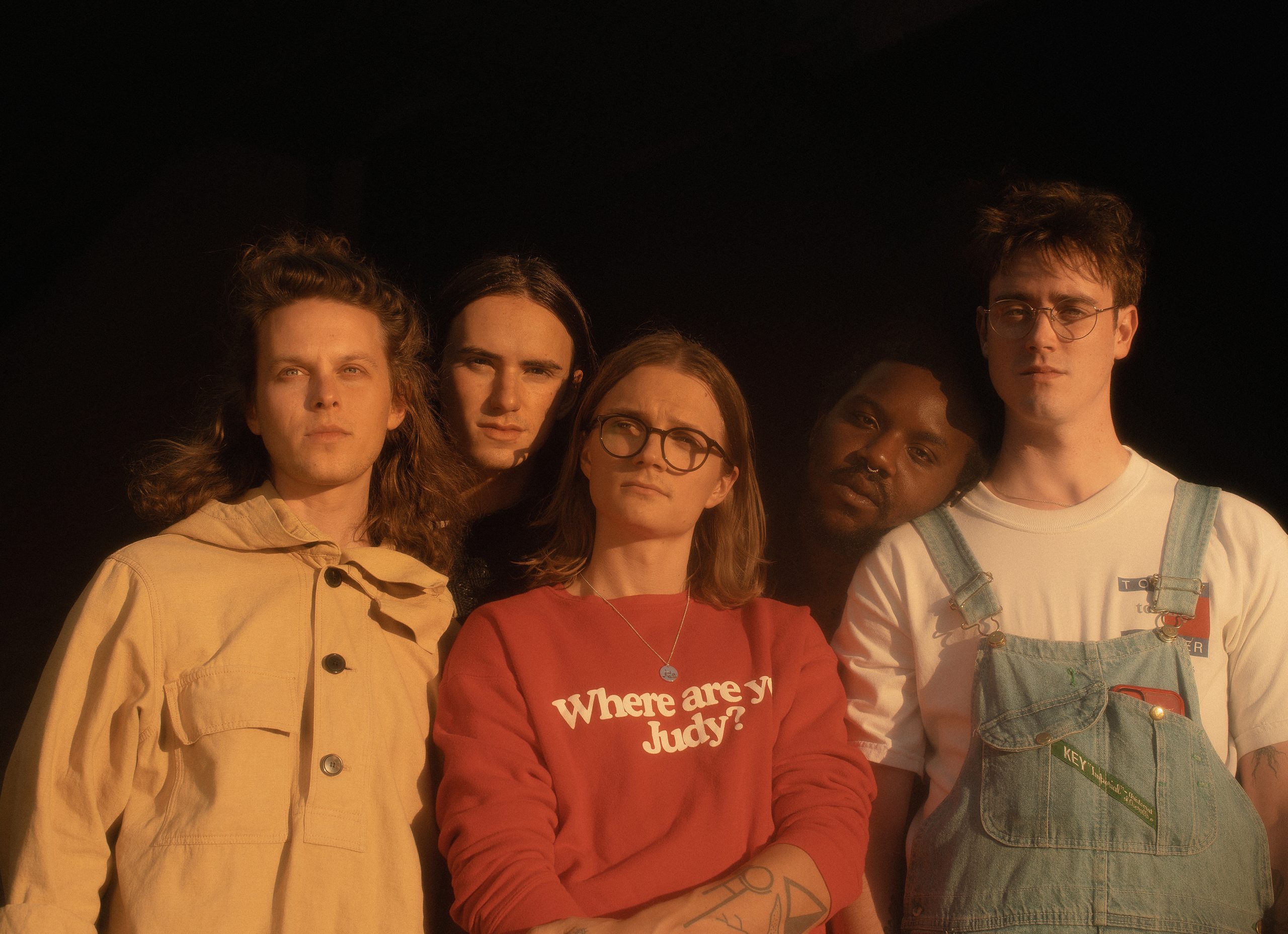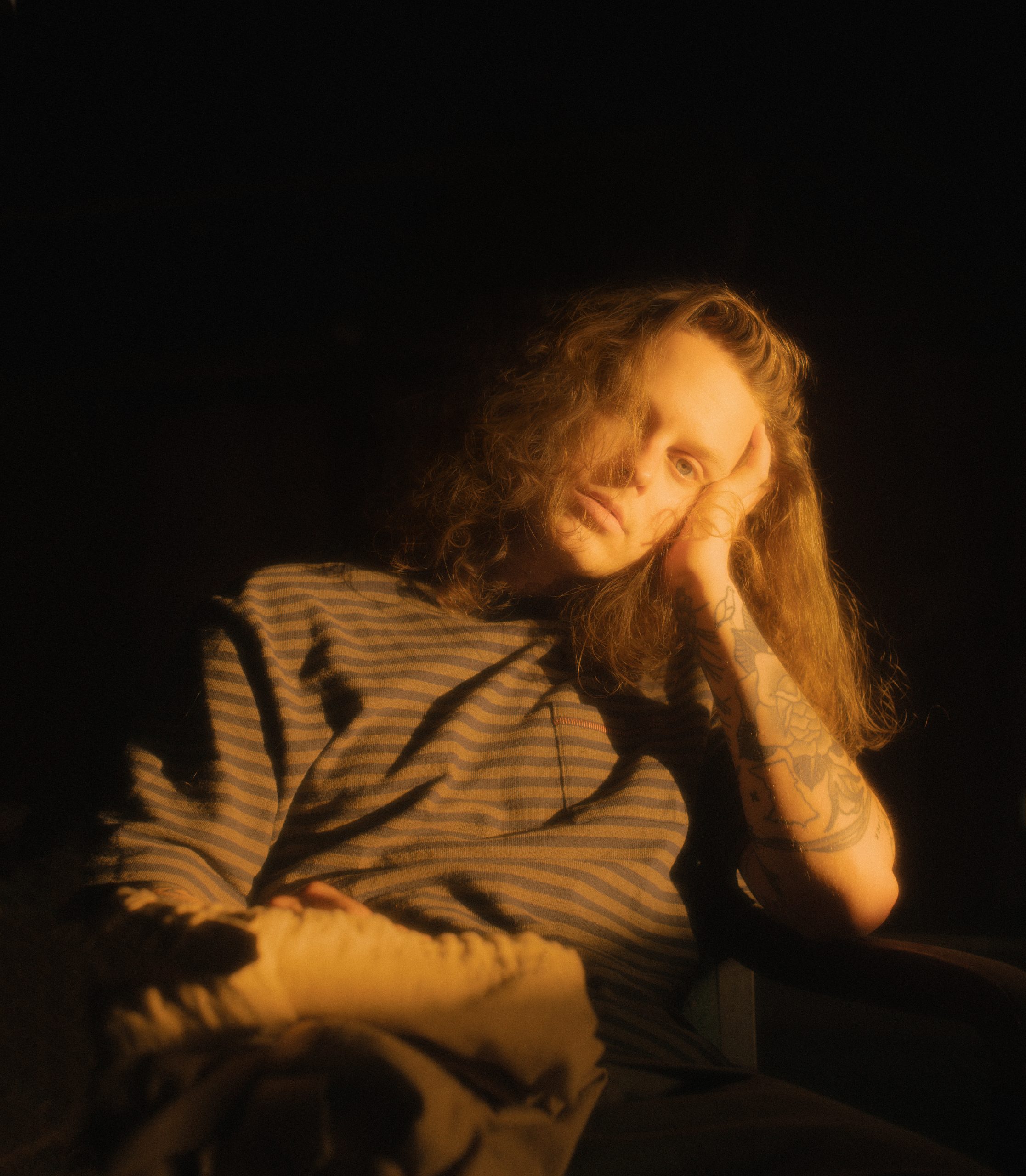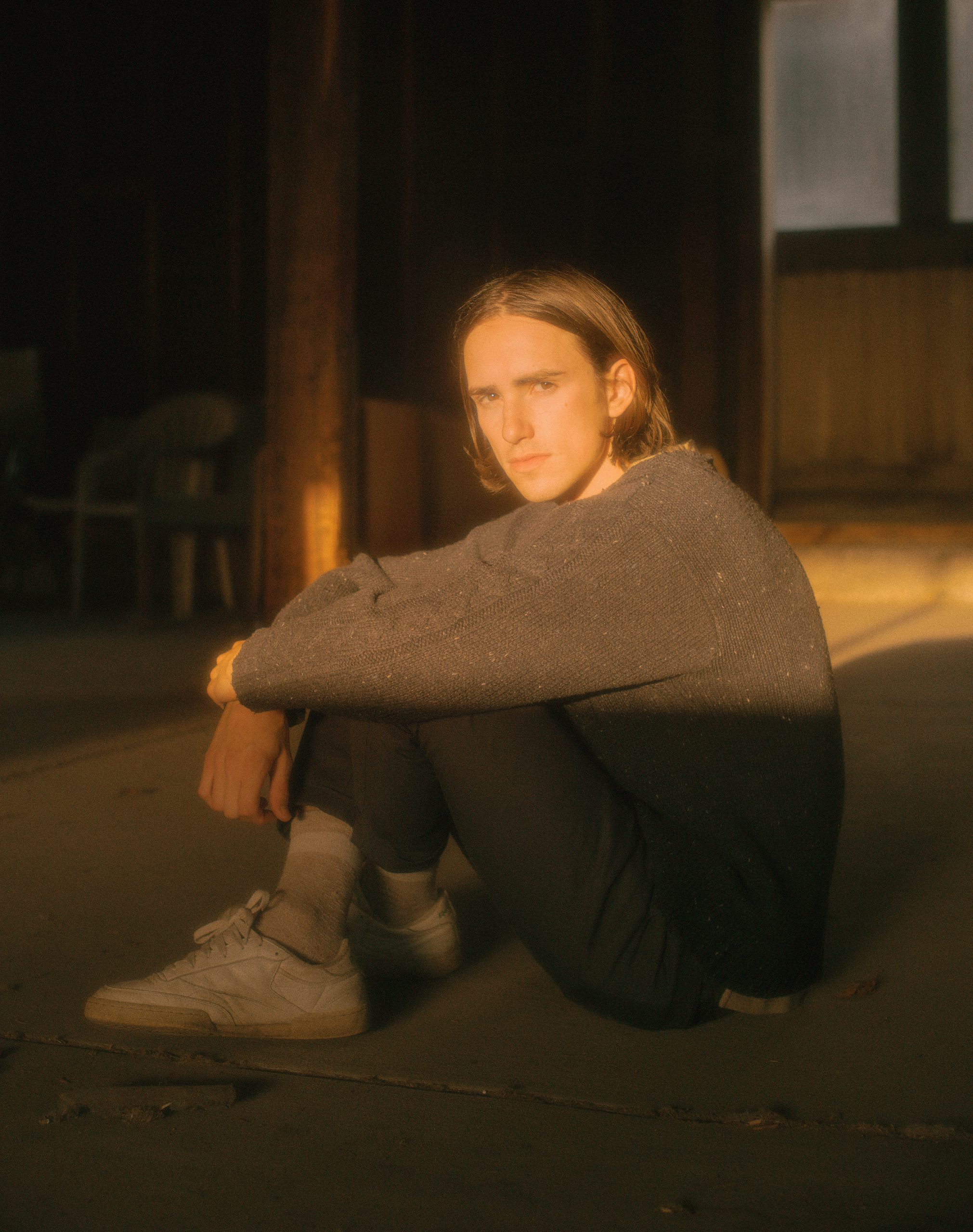
Sometimes in order to gain clarity, you have to take a few steps back. At the beginning of 2020 Hippo Campus found themselves doing just that. The five-piece – made up of vocalists/guitarists Jake Luppen and Nathan Stocker, drummer Whistler Allen, bassist Zach Sutton and trumpeter DeCarlo Jackson – had been touring non-stop for years, using any time they had off to work on music. Before the pandemic even began, the band made the choice to take a second to recenter.
After two years they are back, not only with new music, but with a new sense of self. Their third record, LP3, is as direct as the title. During their time off each band member took the time to self-reflect, question their personal intentions, as well as their intentions within the band, and gained a better understanding of who they are without music, so that they could fully realize who they are as both a band mate and a group. Their new record is their most honest work to date, as they touch upon topics such as hitting rock bottom on “Boys,” experiencing ego death on “Semi Pro,” and the fluctuation of relationships on “Ride or Die.”
We caught up with Jake Luppen, Nathan Stocker, and Whistler Allen over Zoom to discuss the making of their new album, what it was like to separate who you are from what you do, and how their relationship with each other has changed over the years.
This interview has been edited and condensed for length and clarity.
I read that a big part of the album, and specifically one of the singles “Semi Pro,” deals a lot with separating yourself from your art. What has that looked like for you?
Nathan: Yeah I think the reality of 2020 was that we were faced with a lot of questions about what we were doing and why we were doing it. Some of those questions were: do I like what I’m doing? Do I belong here? Am I good at what I’m doing? So “Semi Pro” tackled that and I think the process of getting to a place where we felt comfortable not only writing music, but just being in a band with each other. I think getting to that comfort zone again required a lot of questioning and self reflection to feel comfortable being who we are. We’ve done that as individuals and as a group together over the last two years. I think that this record is that, solidified into thirty three minutes. It’s all the questions and all the answers that we came away with. Not an easy task, but definitely a rewarding one and hopefully it’s easily translated with this record.
Jake: For me I think it’s finding purpose in other things outside of just like playing shows. I think prior to the pandemic, for six years, we had been on tour non-stop. So my entire identity was based around getting up on stage and playing music for people or coming home in those two month gaps and writing non-stop. So for me it just meant spending time with my family and my loved ones, actually getting to spend time with my partner, buying a house and just making life changes. Just realizing there’s more important things than music out there.
My mom was actually a musician too. From twenty to thirty she toured and then she ended up getting this rare neurological condition where she couldn’t sing anymore. So her instrument was taken from her and she always talked about the importance of finding yourself outside of what you do. I don’t think I ever really understood it until I got in so deep and then I imagined losing it and seeing what my mom went through and I was like I need to figure my life out (laughter).
I read that this album was, in a sense, an ego death where you started making music for yourselves again instead of making music for other people and what you thought they wanted. Was there a specific moment when you felt that shift occur? Was it a conscious decision?
Whistler: I think when we parted ways with our manager that was the first thing we had ever really done that was a huge shift for us. We had experienced similar things in the past, but nothing that fundamental to the future. We did what we had to do and we are grateful for everything that led up to that point, but I think, whether we were aware of it or not, that was the initial moment. And then honestly for me I feel like it took almost another year to kind of wake up and realize like oh my god it’s gonna be another year of thinking who am I everyday and how do I find meaning? It’s been like a gradual two years. We had planned to have 2020 off and that was before Covid even hit. It just weirdly lined up and then in many weird ways the pandemic has been a huge benefit to our business. Which is not something you would usually hear and I don’t like that. I guess it’s not the pandemic, but the time that it has forcefully provided has been a massive benefit for us as a business and as a people. I think we would’ve crumbled if we had to get back into touring or at least we would’ve crumbled the moment we did have time to think and ponder.
Nathan: It was definitely a conscious decision to go into the studio with our producer and best friend, Caleb, to just huddle around the campfire again and share war stories to get back to why we make music together and the essence of the band. It was definitely something that we needed to do.

You mentioned working with your producer Caleb. What was that experience like? I know there were some unconventional production choices like the hitting of trash cans and pots and pans.
Whistler: The other night we were hanging with him and he said we had to bring this up if it was ever asked and you’re not asking directly about it, but there’s these little clap sounds or stick sounds in “Bang Bang” that are the percussion and he wanted people to know so badly that, it was Nathan slapping his own ass (laughter). So that’s probably the most unconventional one.
Nathan: Having gone to high school with him and growing up with him, he’s been really close to this band from the beginning. I think that he understood the mission. We started this band just because it was like what if? I think the best things in life kind of end up that way. They kind of start out as jokes almost. But I think that creatively it was just a natural choice to bring Caleb in on this process because he understands us better than a lot of people or any other producer.
How do you feel like this record compares to your previous releases both sonically and thematically?
Jake: I think sonically it’s a bit more DIY. Having worked with BJ Burton, who’s like one of the best sonic people in the industry, I think there had been an emphasis placed on quality and having things be immaculate. On this record there’s something dirty about it that I really like. It reminds me of the early days of the band, like the early EPs. There’s like an iPhone microphone recording on “Listerine.” For some of “Bang Bang” I was just in my room on mushrooms. Caleb’s an amazing producer, so he was able to take all of this raw information and craft it into this thing that feels very us, very reflective of the journey that we’ve been on, that included all the parts of Hippo Campus that I’ve loved along the way.
Songwriting wise it’s probably our most personal record yet. I feel like I’m writing a lot about my experience and there’s a lot of topics that are uncomfortable at times to sing about. I just feel like in the past three or four years I’ve just grown up so much. I feel like touring for that long kind put me in a state of arrested development (laughter). I was just very confused for a few years about what my place was and what I was doing. I’m finally comfortable to say this is what I’ve been through, this is what I’m going through, this is who I am and not wrap that in a bunch of weird poetry that doesn’t make sense like I did in the past (laughter). Those songs are cool, but they just don’t hit the same spot for me when I listen to them. They hit a general spot, but in the future I want to keep tearing into this weird personal space.
So I know “Boys” was the first single off the album, so Jake if you’re comfortable, can you tell me about what it was like to write that song having recently come out?
Jake: For the past three years or so I’ve been kinda open with my friends about my sexuality. I was in this relationship with a woman for a very long time. I think a lot of it was that I didn’t feel queer enough to be like, “I’m queer!” I was afraid of judgment having not necessarily been in a relationship with a man and predominantly dating woman. I felt because I’m so straight passing I didn’t want to seem like I was co-opting anything. So I didn’t really want to take that on, but when I was writing music I was like starting to write about it because it was a part of who I was and I was exploring and figuring all of these things out. So it got to a point where I was like alright, fuck, I’ve written these songs, people are gonna hear this.
As far as in the future it’s still a weird thing for me to talk about publicly because I’m so comfortable with it in my life and the people who know me, but to people who don’t know me it’s still a strange thing to talk about. I recognize I have to talk about it because I write songs about it. It’s just a sensitive topic, I don’t want to make anybody upset. The people who fucking hate me because I’m queer, like whatever, fuck you, I do not care about that. But the people who have had to live that journey and aren’t as straight passing as me, I don’t ever want them to feel like I’m infringing on their territory. It’s a rocky road.
I’d love to hear about the choice for that to be the first single and how you feel it set up the rest of the album from a thematic perspective?
Nathan: I think the sobering reality of life is what that song is really about at its core. With everything that we’ve been describing of getting back to the basics, getting back to the essence of the band, that song made sense cause it is a sobering look at like what the fuck am I doing? Having released Good Dog, Bad Dream earlier in the year I think “Boys” provides a stark contrast to that project. We wanted to make that comparison, we wanted it to feel like, okay we’re kind of starting over again. Like Good Dog, Bad Dream was definitely a palette cleanse and I think “Boys” in addendum achieved the same kind of thing. It wasn’t really initially a single to us. There were other contenders, but I don’t think that any of them would have achieved that sort of sobering up effect that we wanted to with “Boys.”
Whistler: Yeah I think it also was probably one of the more poppy sounds on the whole record, from the production to the melodies, to just all of it really. But I think it’s cool that, that worked because then maybe people like that, maybe they don’t, but then everything that’s left to come is like really just like a bunch of different branches below that cause “Boys” is just like this pop thing that people would maybe expect from most bands. But then “Semi Pro” is different from anything we’ve done, still pretty poppy. “Ride or Die” is pretty different from anything we’d done, but seemed to be the golden ticket. Yeah I don’t know, I think it’s all like weirder and weirder variations of “Boys.” “Boys” is weirdly like the title track almost, but it’s not.
You’ve obviously been friends for so long and now not only do you have a friendship, but you have a business relationship and you have a relationship as band mates. How have you maintained all of those and was the dynamic during the recording of this album any different than it has been in the past?
Jake: It’s like a family, I guess. These guys are my brothers and I think like with any family there’s fighting and annoyances and what not, but at the end of the day you love each other and that’s all that matters. I think Hippo Campus will be around forever. That’s obviously a lofty statement, but I just feel like we’ve put so much time into this band and we’ve just been so good at navigating those things. I feel like it’s just like soul bond type shit. We’ll probably take breaks in like chunks of years, but I just feel like we’re a band that’s not gonna break up just cause we would’ve already broken up by now if we were going to. We’ve been through so much together and we know how to navigate it. I think a lot of it is probably just like Midwest ideals or something. Like we’re not out in LA or New York getting caught up in bullshit, like we’re here isolated in Minnesota, we mainly hang out with each other in our apartments. There’s not a lot going on here. I think it’s just given us a healthy perspective on life.
Whistler: I think it has changed. Every album’s been different. This one’s maybe been the best. We were the most conscious during this one. I think last time we were trying too hard to be conscious about what we were doing and to us I think that shows. But it’s definitely a fine line between thinking too much and not thinking enough about what you’re creating being intentional, and how you do that with others.
In a way, this is crazy, but it feels like we’ve all divorced, but we’re still best buds. It’s like when divorced couples are still really close with each other as friends, that’s how it feels. There’s still unconditional love for everybody and we would die for each other, but we’re not necessarily married anymore in terms of emotional space and I think that’s cool cause it feels like one step further in my mind. I think we had our beautiful divorce over these last two years and we were like, but you know we’re gonna make it work.

CONNECT WITH HIPPO CAMPUS
INSTAGRAM // TWITTER // SPOTIFY // WEBSITE
photos / Tonje Thilesen
story / Sloan Pecchia
